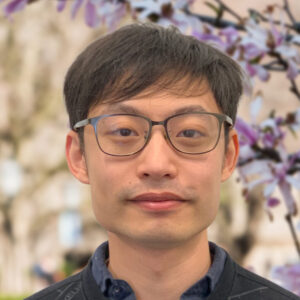Yihang Wang
RESEARCH:
Yihang Wang’s research seeks to use simulation tools to better understand biological systems. There are several challenges when using molecular simulations to study biological systems. One is how to represent a real system accurately with a model. Another challenge is that many events of interest are rare. That is, even with the most powerful computational resources currently available, it can still take hundreds of years or more to simulate molecular processes. Finally, it is also a challenge to understand the huge datasets generated by molecular simulations. Wang tries to address these issues by combining artificial intelligence (AI) with statistical mechanics. Statistical mechanics provides the theoretical basis for the simulation study of biological systems, while AI has shown great potential in automatically making sense of large, high-dimensional data. Their combination opens up possibilities for overcoming the curse of dimensionality and bridging the gap between theory and applications/simulations. Therefore, Wang hopes to utilize their synergies to make simulation tools applicable to systems with arbitrary complexity and timescale.
BIO:
Yihang received his B.S. degree in Physics from the Southern University of Science and Technology (SUSTech) in 2017. He then started his Ph.D. studies in the Biophysics program at the University of Maryland, College Park (UMD). Advised by Prof. Pratyush Tiwary, he explored the possibility of combing AI techniques with molecular dynamics simulation to study the interaction mechanisms of (bio)molecules. He was a postdoctoral fellow at the Chicago Center for Theoretical Chemistry (CCTCh) before becoming an Eric and Wendy Schmidt AI in Science Postdoctoral Fellow.
